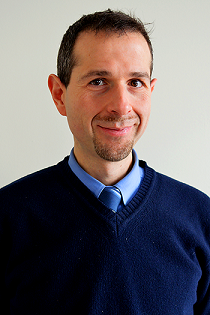Meet EPA Researcher Vito Ilacqua, Ph.D.

Tell us about your background.
I studied environmental science in Italy, at the University of Milan. I did my Ph.D. at Rutgers University in New Jersey.
As an undergrad, I was interested in air and air pollution. In graduate school, my interest expanded to exposure science. Over time, the two topics merged together for me.
When did you first know you wanted to be a scientist?
My earliest memory of science was wanting to study animal behavior, which was when I was younger than 10. The books of Konrad Lorenz on that topic definitely influenced my interest in science as a career. When it came time to pick a major, I was torn between biology and physics. I ended up choosing environmental science because it offered me the opportunity to do both, and then some.
How does your science matter?
One of the topics I work on is the impact of climate change on indoor air quality. The distinction between the air we breathe outside and the air in our homes is a bit artificial, because the two environments continually exchange air. The change in temperature outside drives the exchange of air between indoor and outdoor air. Even a small increase in outdoor air temperature, which we expect from climate change, can potentially have a large effect on how much air is exchanged between these two, and how much we are exposed to both indoor and outdoor sources of pollution. The question we are asking is, will the change in exposure be significant to health?
I also manage research funded by EPA grants, which gives me a front seat to some of the best research being done around the country, on air quality and environmental epidemiology. There’s satisfaction in the multiplying effect of starting with a research question and seeing the research carried out by so many others.
If you weren’t a scientist, what would you be doing?
I like to think that I would be a poet and philosopher, though not necessarily a good one. It’s certainly something that occupies my free time. More realistically, I would like to do something that is a combination of art and science, whether it’s making gelato or perhaps building large aquariums for public spaces. Some type of creative but scientific activity.
If you could have dinner with any scientist, past or present, who would it be and what would you ask him or her?
Galileo Galilei comes to mind for me. The question would be the relationship between truth and power. It’s a situation in which scientists find themselves repeatedly and will continue finding themselves in. Truth triumphs in the end, but in the short term, what are the best ways to negotiate conflicts that are brought about by the pursuit of science?
If you could have any superpower, what would it be?
I often fantasize about controlling time, because that’s a resource I never seem to have enough of. Freezing it would be nice, but other ways to move back and forth in it would be good. Time manipulation would be awesome.
What advice would you give students interested in pursuing a career in science?
If curiosity is one of your main motivators, then go for it. A career in science will give you an immense personal satisfaction, knowing that you are doing something that benefits humankind. If you do pursue science, my advice is to be flexible. The interesting questions keep changing as we learn more. Don’t be afraid to switch around your research area and perhaps even go into depth in more than one discipline because there is much to be gained by bringing the experience and methods of one area of science into another.
What is the coolest scientific discovery?
This is where my would-be philosopher comes up again. I would say either the discovery of an expanding universe or the uncertainty principle are the most mind-blowing ones to me. In both cases, the sense that they give is that we live in a universe that is always going to keep us guessing. We need science to understand the world.

Dr. Vito Ilacqua in Hong Kong.
What is the biggest scientific challenge we face in the future?

Energy. How do we get enough of it without too many side effects? It seems that every other limitation that we come up against, whether issues of time, resources, entropy, can be reframed as not having adequate energy available. Once we get access to plenty of sustainable energy, there will be no limit to what we can do.
Whose work in your field are you most impressed by?
I am impressed by the work that people are doing about the epigenetics of air pollution, particularly the work of Andrea Baccarelli. In other areas, I think that the entire cosmological quest is something that we’ll look back as perhaps one of the greatest achievements of our time. Even the process of inventorying what is out there is incredible and gives us a sense of scale in our place.
If you were stranded on a desert island with a group of people, what would your job be?
I would probably be the person telling everyone not to panic. I would try to think through what our next steps would be. That’s what would come naturally to me.
Editor's Note: The opinions expressed herein are those of the researcher alone. EPA does not endorse the opinions or positions expressed.
